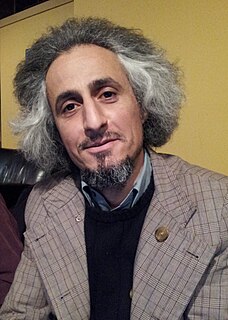
Khāwje Shams-od-Dīn Moḥammad Ḥāfeẓ-e Shīrāzī, known by his pen name Hafez and as "Hafiz", was a Persian lyric poet, whose collected works are regarded by many Iranians as a pinnacle of Persian literature. His works are often found in the homes of people in the Persian-speaking world, who learn his poems by heart and use them as everyday proverbs and sayings. His life and poems have become the subjects of much analysis, commentary and interpretation, influencing post-14th century Persian writing more than any other Persian author.

Hossein Mohyeddin Ghomshei better known as Elahi Ghomshei, is an Iranian scholar, philosopher, author, and lecturer on literature, art, and mysticism.

Baba Tahir or Baba Taher Oryan Hamadani was an 11th-century Persian dervish poet from Hamadan, Iran who lived during the reign of Tugril of the Seljuk dynasty over Iran. This is almost all that is known of him as he lived a mysterious lifestyle. Although prefix "Baba" has been thought as part of his name in all known sources, his nickname "Oryan" did not appear until about 17th-century. The nickname was probably attributed to him because he seemed to lead a very spiritual and stoic lifestyle and thus was figuratively not clothed with worldly and material needs. His poetry is written in the Hamadani dialect of the Persian language. According to L. P. Elwell-Sutton he probably wrote in the Hamadani dialect, adding: "Most traditional sources call it loosely Luri, while the name commonly applied from an early date to verses of this kind, Fahlaviyat, presumably implies that they were thought to be in a language related to the Middle Persian language. Rouben Abrahamian however found a close affinity with the dialect spoken at the present time by the Jews of Hamadan." According to The Cambridge History of Iran, Baba Tahir spoke a certain Persian dialect.
Iranian rock refers to rock music produced by Iranian artists. Rock music has been popular in Iran since the late forties, with the emergence of singers such as Kourosh Yaghmaei, Farhad Mehrad, Fereydoon Foroughi and Habib Mohebian, but was largely forgotten after the Iranian Revolution. Like most rock styles, electric guitar and bass guitar and drums are the main instruments in this type of music. In some groups, the keyboard also has the task of adjusting the rhythms and symbols.

Mohsen Namjoo is an Iranian singer-songwriter, composer and musician. His style of music is influenced by blues and rock as well as Iranian folk music.

Kiosk is a rock band formed in Tehran in 2003, known for its blend of musical styles and its wry lyrics confronting Iranian cultural angst.

Hafez Nazeri is a Kurdish Iranian singer and composer. He is the son of Kurdish Iranian musician Shahram Nazeri.

Sholeh Wolpé is an American poet, playwright, and literary translator. She was born in Iran, and lived in Trinidad and England during her teenage years, before settling in the United States.

Oy is the third studio album by the Iranian singer-songwriter Mohsen Namjoo after Toranj and Jabr-e Joghrafiyaei. Released on 6 October 2009 this was Namjoo's first album produced and published outside Iran.

Jabr-e Joghrafiyaei is the second official studio album by the Iranian singer-songwriter Mohsen Namjoo after Toranj. It was officially released sometime in 2008.
"Ay yōrum biyō" is a famous song by Muboraksho Mirzoshoyev. There are alternate pronunciations in various languages and dialects including "Ay Yarom Biyo" and "Ay Yoram Biyo". It was released in 1988 in Tajik language and has become a staple at weddings.

"Strange Times" is the first official single by Mohsen Namjoo.This is the first song performed in English by Mohsen Namjoo. "Strange Times" words came from the Iranian poet Ahmad Shamlou.
Mohsen Chavoshi Hosseini born in khoramshahr. He is an Iranian musician, singer, record producer and songwriter, based in Tehran. He has released ten albums including a soundtrack to the 2007 film Santouri.

Alaki is a live album by Iranian singer-songwriter Mohsen Namjoo. The album is a recording of a performance at Stanford University in February 2011. The title track Alaki is based on a postmodern poem with social, and at times satirical content that blurs the lines between poetry, music and participatory theater.

13/8 is a live album by Iranian singer-songwriter Mohsen Namjoo.13/8 recorded before a live audience at Berkeley, California on April 28, 2012. The album Released in October 2012.

Trust the Tangerine Peel is the 7th official studio album by Iranian singer-songwriter Mohsen Namjoo. It was released on May 28, 2014. The album is a mixture of original and cover songs using both contemporary and classical Persian poetry. At times, Namjoo attempts to juxtapose or fuse Persian and popular western styles of music, particularly in "Roo Dast" and "Golmammad". Some suggest that "Golmammad" is an homage to Gol Mohammad, the hero of the story of Kelidar, written by the notable Iranian writer, Mahmoud Dolatabadi. However, in interviews, Namjoo has stated that "Golmammad" has been based on a traditional song from Sabzevar and that he didn't have the hero of Kelidar in mind at the time of writing it. The song "Adam-e Pooch" is a cover version of "Nahang" by the late Ebrahim Monsefi, an Iranian musician and singer from Bandar Abbas, Iran.

Hamadan or Hamedan is the capital city of Hamadan Province of Iran. At the 2019 census, its population was 783,300 in 230,775 families. The majority of people living in Hamadan identify as ethnic Persians.
"Begoo be baran", is a single by Iranian singer-songwriter Mohsen Namjoo. The poem is by Iranian famous poet Shafiei Kadkani and the whole song is a dialogue with the rain, and its music video is acted by another Iranian musician named Parham Alizadeh. The song is dedicated to Hossein Alizâdeh and Mohammad-Reza Shafiei Kadkani.
Mostafa Heravi is an Iranian filmmaker, photographer, and visual artist currently residing in Netherlands.

Sheida Gharachedaghi is a Persian-Canadian composer and music educator, based in Montreal.















